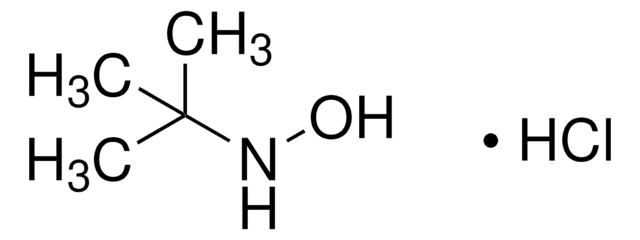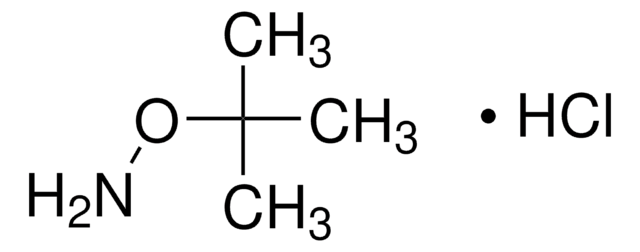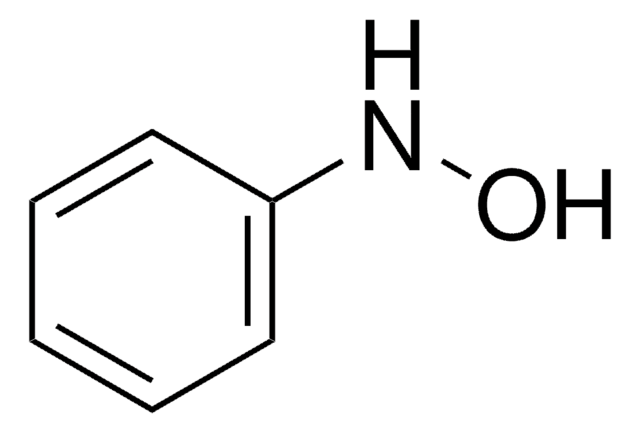All Photos(1)
About This Item
Linear Formula:
(CH3)3CNHOH·CH3CO2H
CAS Number:
Molecular Weight:
149.19
MDL number:
UNSPSC Code:
12352100
PubChem Substance ID:
NACRES:
NA.22
Recommended Products
Assay
97%
mp
65-69 °C (lit.)
SMILES string
CC(O)=O.CC(C)(C)NO
InChI
1S/C4H11NO.C2H4O2/c1-4(2,3)5-6;1-2(3)4/h5-6H,1-3H3;1H3,(H,3,4)
InChI key
QGYZLVSWEOXOFT-UHFFFAOYSA-N
General description
N-(tert-Butyl)hydroxylamine acetate (NtBuHA acetate) is a derivative of hydroxylamine that shows thioesterase-mimetic and antioxidant characteristics.
Application
N-(tert-Butyl)hydroxylamine acetate has been used in a study to understand its effect on CD (cathepsin D) activity.
It may be used in the preparation of:
It may be used in the preparation of:
- (Z)-α-5-bromo-N-tert-butyl-2-methoxyphenylnitrone
- ONO-type pincer ligand
- hydroxyphenyl nitrones
Signal Word
Warning
Hazard Statements
Precautionary Statements
Hazard Classifications
Eye Irrit. 2 - Skin Irrit. 2 - STOT SE 3
Target Organs
Respiratory system
Storage Class Code
11 - Combustible Solids
WGK
WGK 3
Personal Protective Equipment
dust mask type N95 (US), Eyeshields, Gloves
Certificates of Analysis (COA)
Search for Certificates of Analysis (COA) by entering the products Lot/Batch Number. Lot and Batch Numbers can be found on a product’s label following the words ‘Lot’ or ‘Batch’.
Already Own This Product?
Find documentation for the products that you have recently purchased in the Document Library.
Customers Also Viewed
(Z)-α-5-Bromo-N-tert-butyl-2-methoxyphenylnitrone.
Guo H, et al.
Acta Crystallographica Section E, Structure Reports Online, 63(10), 3943-3943 (2007)
Microwave-assisted synthesis of hydroxyphenyl nitrones with protective action against oxidative stress.
Chavarria C, et al.
European Journal of Medicinal Chemistry, 58, 44-49 (2012)
Goutam Chandra et al.
Human molecular genetics, 24(19), 5416-5432 (2015-07-15)
Neurodegeneration is a devastating manifestation in the majority of >50 lysosomal storage disorders (LSDs). Neuronal ceroid lipofuscinoses (NCLs) are the most common childhood neurodegenerative LSDs. Mutations in 13 different genes (called CLNs) underlie various types of NCLs, of which the
Ruthenium ONO-Type Pincer Complex: Synthesis, Structural Characterization, and Catalysis.
Zhang Y, et al.
Advanced Synthesis & Catalysis, 352(10), 1779-1783 (2010)
Our team of scientists has experience in all areas of research including Life Science, Material Science, Chemical Synthesis, Chromatography, Analytical and many others.
Contact Technical Service








